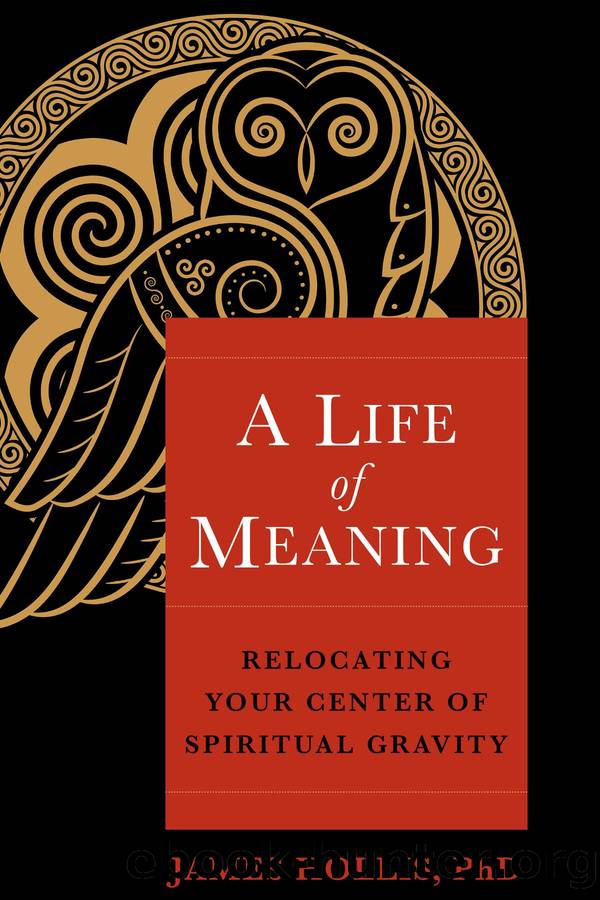A Life of Meaning: Relocating Your Center of Spiritual Gravity by James Hollis Ph.D

Author:James Hollis, Ph.D. [Hollis, James]
Language: eng
Format: epub
Tags: PSY045060 PSYCHOLOGY / Movements / Jungian, SEL032000 SELF-HELP / Spiritual
Publisher: Sounds True
5
Dispelling the Ghosts Who Run Our Lives
We all live in haunted houses and sleep in memoryâs unmade bed. In this chapter, weâre going to look at the presence of the past thatâs with us all the timeâwhat I call âhauntings.â
The Human Psyche Is Timeless
While housed in a fragile frame, the human psyche is timeless. Thatâs how you can suddenly dream of a child you knew in third grade and perhaps havenât seen in decades, remember an old schoolteacher, or revisit some moment in your history that was long ago and far away. In those moments, you realize the timelessness of the psyche. Everything thatâs ever happened is present, recorded, and often âstoried,â as youâve read in prior chapters. What are the stories that we evolved, consciously or unconsciously, around those moments?
Photographs are examples of how we consciously seek to retain a link to our past. Why do we take photos? Weâre trying to freeze the moment. Weâre trying to stay the passage of time and be able to go back to it and somehow recreate it. In that little frame, we have a whole welter of emotions and untold stories. But all that has happened is stored intrapsychically in any case. It not only remains there, waiting to be activated, but it carries a quantum of energy capable of moving us to tears, unwitting behaviors, and occasionally moments of insight.
Diane Wakoski wrote a fascinating poem titled âThe Photos.â1 She recounts a rather painful visit with her mother and sister. Itâs clear there is much unspoken, much history, and many ghosts. She constantly refers to her âwell-dressedâ sister and her more casual self as well as her motherâs sour and critical presence.
On the table is a photograph of her father, the former husband of her mother. She makes a passing reference to it, and suddenly everything comes down to that photo, which stirs up all the memories of the past. It becomes very uncomfortable for all. She has to get out of there, so she makes an excuse and drives off toward her home. As sheâs driving down the highway, all she can do is think about her motherâs face and how she inherited that face. She sees her reflection in the rearview mirror as she crosses lanes, she sees her motherâs face staring back at her, and she realizes she is still haunted, owned by that history, which she has been so desperate to escape.
Clearly the photo contains a lot of history and a lot of âghosts.â Given that sheâs a poet, Iâm sure she pays careful attention to what each word means. She could have said, âOh, I donât like the fate that brought me into this particular marriage, this particular family, this particular history.â But instead she says âdestiny,â almost implying as much as she tries to flee, as much as she wishes to get away, history pursues her. Historyâs haunting is even imprinted in the face that sheâs inherited from the mother from whom she is so estranged.
Download
This site does not store any files on its server. We only index and link to content provided by other sites. Please contact the content providers to delete copyright contents if any and email us, we'll remove relevant links or contents immediately.
| ASVAB | GED |
| GRE | NCLEX |
| PRAXIS | SAT |
| See more | Flash Cards |
| Study Guides | Study Skills |
| Workbooks |
Talking to Strangers by Malcolm Gladwell(11920)
The Compound Effect by Darren Hardy(7586)
The Lover by Duras Marguerite(7138)
Wonder by R. J. Palacio(7083)
Tools of Titans by Timothy Ferriss(6978)
The Circle by Dave Eggers(6277)
A Court of Wings and Ruin by Sarah J. Maas(6125)
Kaplan MCAT General Chemistry Review by Kaplan(6073)
Deep Work by Cal Newport(5514)
To All the Boys I've Loved Before by Jenny Han(5192)
Wiseguy by Nicholas Pileggi(4610)
1,001 ASVAB Practice Questions For Dummies by Powers Rod(4050)
The Body: A Guide for Occupants by Bill Bryson(3831)
Barron's AP Biology by Goldberg M.S. Deborah T(3640)
Cracking the GRE Premium Edition with 6 Practice Tests, 2015 (Graduate School Test Preparation) by Princeton Review(3605)
ACT Math For Dummies by Zegarelli Mark(3571)
Eat That Frog! by Brian Tracy(3533)
Kaplan MCAT Organic Chemistry Review: Created for MCAT 2015 (Kaplan Test Prep) by Kaplan(3431)
Pre-Suasion: A Revolutionary Way to Influence and Persuade by Robert Cialdini(3431)
